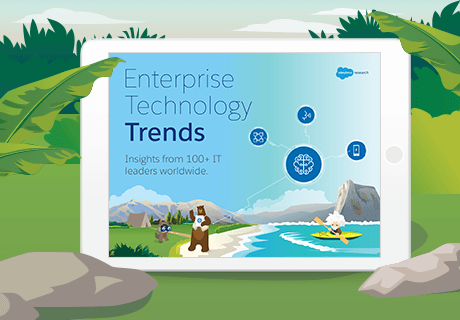Salesforce has released its Enterprise Technology Trends report that provides insight from +100 IT leaders on how “enterprise technology trends will shape the landscape of the new normal, the next normal, and beyond”.
The key areas of enquiry were: customer experience; employee experience; developer experience; mobile technology; system integration; artificial intelligence; voice technology; IT staff learning and development; blockchain; security and trust.

On the subject of mobile technology, 90% of IT leaders said, “businesses must be mobile-enabled to survive in the future”. However, the reality on the ground is that high priority is being placed elsewhere because of competing demands, low skill levels and strategies that are not properly defined (which may suggest a lack of thought leadership).
Only 44% of respondents said that mobile technology is a high priority. Meanwhile, 63% of the workforce use a mobile phone “for work tasks as much as for personal tasks” and this rising mobile workforce is placing increasing demands on IT and developers. The “mobile-first future” is being driven partially by the “anytime, anywhere” philosophy, and globalisation and the dispersed-teams model, which results in teams operating from multiple bases and time zones.
In this regard, 99% of IT leaders say, “businesses must be mobile-enabled to survive in the future”, but 74% say that “a lack of mobile access to business apps, data, and content will slow business productivity in 2025”. This suggests that a roadblock is on the horizon – or perhaps already here.
Most participants (83%) believe that the most successful organisations will transition from a desktop-first to a mobile-first development approach by 2025, with “nearly all mobile apps to be built on a common set of frameworks and standards”.
They expect that “unprecedented innovation” will redefine the role of mobile technology in the enterprise, with one respondent stating, “With 5G deployed, the mobile enterprise will change dramatically with device convergence replacing the desktop altogether”.

However, with the limited developer talent pool being in huge demand, companies are being constrained: 72% of the IT leaders say, “project backlogs prevent work on strategic projects”. Yet only 10% have “a completely defined strategy” on this matter and only 20% say that the “developer experience is a priority”.
Developer’s lives may be made easier, though, if new development techniques and technologies are adopted, while businesses “that focus on their internal IT learning and development programmes will be in much better shape to handle the challenges.”
Data for the study was collected via surveys, with participants from the US, Europe and Asia Pacific. Company size represented was mostly 5 000-9 999 and +10 000. The main sectors represented were technology, healthcare, financial service, manufacturing, telecommunications and retail and consumer goods.
Juliet Gillies is a highly skilled writer, editor and English specialist. She is a professional writer, having started in the marketing/communication field, but now focuses on educational materials and articles on Digital / Social Media / Marketing matters. She has been writing and editing at a professional level for more than 30 years.
(Sources: Salesforce (//www.salesforce.com/eu/blog/2020/01/enterprise-technology-trends-report.html; //www.salesforce.com/content/dam/web/en_gb/www/pdf/SF%20Research%20-%20Enterprise%20Technology%20Trends%20Report%20(2019).pdf)).
Ends














